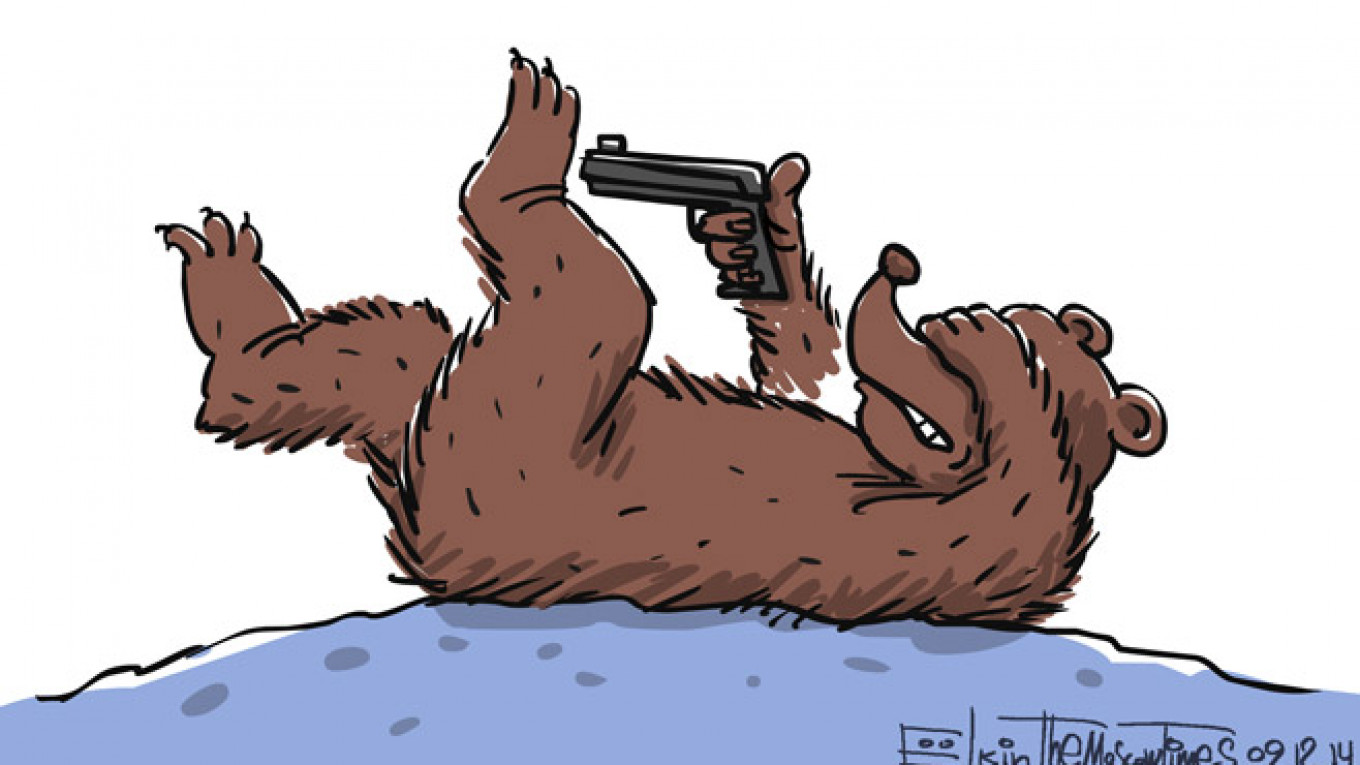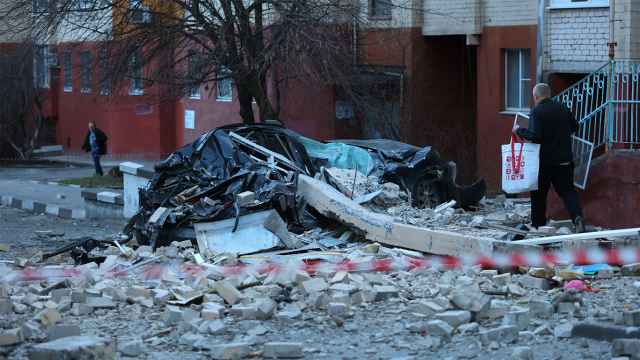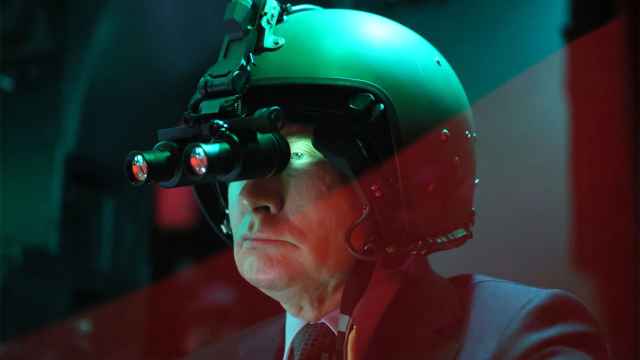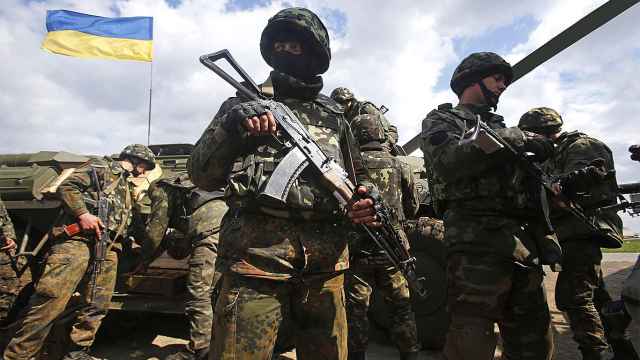A new agreement between Eurasian Economic Union members Russia, Belarus, Kazakhstan and Armenia will go into force on Jan. 1. Moscow had serious trouble convincing its main partners in Minsk and Astana to come on board and participate in the EEU, if only because the exact terms of cooperation within the earlier Customs Union agreement were never fully defined — although they form the foundation of the EEU. That Customs Union has undergone yet another round of "stress tests" in the last couple of weeks.
Russian citizens don't much like to read the small print when taking out a loan or signing official documents, and the Russian government does not like adhering to the rules it has itself agreed to in official treaties and agreements. Everything suffers from such "legal nihilism," and yet Russian officials continue stumbling into pitfalls — and the Customs Union is no exception.
Belarussian President Alexander Lukashenko recently complained that the Russian Federal Veterinary and Phytosanitary Inspection Service not only stepped up controls on deliveries of Belarussian fruits and vegetables — the watchdog claimed they were actually European products that Russia had sanctioned and were imported as "transit goods" to Kazakhstan — but was also upset that Russia had banned deliveries of meat and milk products from more than 20 Belarussian companies on the pretext that they contained dangerous bacteria.
It is a well-known phenomenon that the watchdog has an amazing ability to find harmful bacteria in food products coming from countries with whom Russia is locked in disagreement. Some call that "selective justice," but former Spanish dictator Francisco Franco was not so euphemistic: "For our friends, everything," he said. "For others, the law."
However, as bad as the methods were that Moscow used in its trade wars with Georgia and Moldova, they are even more out of place when applied to Russia's closest allies during a time of Western sanctions.
If integration within such structures as the Customs Union and Eurasian Economic Union are to have any future at all, the participants might take a clue from the European Union. EU members make decisions by consensus, and larger countries must consider the interests of their smaller neighbors — though, of course, major powers might peddle their influence in back-room negotiations.
In this day and age, alliances based on mutual partnership require courtesy, patience, respect for legal procedures and at least a show of respect for the "small" partners.
Russia pursued its own interests by hurrying to impose sanctions against EU and U.S. agricultural products. Officials forgot about the losses that Russian importers would bear as a result, and so they retroactively adjusted the list of banned goods in the realization that, in their haste, they had managed to "shoot themselves in the foot."
In their rush to show the West that Russia would not be intimidated, they had no time for legal formalities, much less for worrying about how the measures would affect the former Soviet republics. Moscow's logic: "They'll just have to go along with the program — after all, what choice do they have?"
However, the world has changed: Now, even the smallest countries do not want to "go along with the program" — even when the mighty United States is setting the agenda.
The Customs Union agreement allows member countries to implement restrictive measures such as Russia's food bans, but only after giving three days' notice. However, Moscow apparently gave no warning to its partners. Such considerations might seem trivial to the great and powerful Russia, but the smaller countries are very sensitive to such matters.
If Moscow wants to continue integrating the former Soviet republics according to new and non-imperial terms, it is time to get used to the new rules of conduct.
The Customs Union agreement also stipulates that member countries can unilaterally introduce restrictive measures — such as the ban on Western foods that Russia announced in August — for only a maximum of six months. That means Russia must lift those sanctions no later than February 2015 if it plans to abide by the letter of the Customs Union treaty — and if it cannot reach agreement with Belarus and Kazakhstan on an alternate approach.
Formally, Lukashenko is right to complain about Russia halting the transit of food products from Belarus to Kazakhstan. According to the agreement, any goods that clear customs in Belarus can be imported to Russia. Belarus and Kazakhstan had earlier opposed another unilateral Russian measure — the decision to increase customs duties on Ukrainian goods.
At the same time, the three countries did manage to reach agreement on another question. The Customs Union Commission confirmed protectionist anti-dumping measures against a list of individual Ukrainian goods. And although Russia was the driving force behind the decision, the Customs Union partners agreed to impose the same measures at home. That shows they are capable of agreeing on something.
However, as the experience of the EU has shown, any full-fledged union is built not so much on the punitive or retaliatory measures it imposes on "common enemies," but is built more on common values, a complex system of interdependence, mutual respect and mutual attraction.
The EU experience also shows that, for all its red tape, bureaucracy, slow progress and "boring" procedural requirements, the patient use of such methods makes it possible for 28 very different countries to reach agreement.
Although Belarus really has significantly stepped up imports of Western food products that Russia has banned, does that warrant dismantling the Customs Union and reviving cross-border barriers? Without the legal right to impose customs limits on the border with Belarus, Russia — if it was really itching to — could inspect importers and their goods once they enter Russian territory without putting its partnership with Minsk and Astana at unnecessary risk.
But it is apparently more important for Moscow to angrily show that "damned West" what it really thinks than about mutually beneficial cooperation and integration with its neighbors and few remaining allies.
Georgy Bovt is a political analyst.







